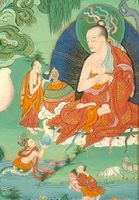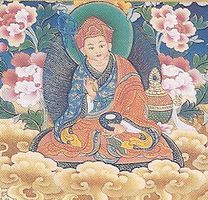Nāgārjuna: Difference between revisions
No edit summary |
No edit summary |
||
| Line 1: | Line 1: | ||
{{Person | {{Person | ||
|PersonType=Classical Indian Authors | |||
|images=File:Nagarjuna.jpg{{!}}[http://www.himalayanart.org/ Himalayan Art Resources] | |||
File:PNT Rigdzin Nagarjuna.jpg{{!}}Painting by Pema Namdol Thaye [https://www.padmastudios.com Courtesy of Padma Studios] | |||
|HasDrlPage=Yes | |HasDrlPage=Yes | ||
|HasLibPage=Yes | |HasLibPage=Yes | ||
|HasRtzPage=Yes | |HasRtzPage=Yes | ||
|HasDnzPage=Yes | |HasDnzPage=Yes | ||
| | |MainNameTib=ཀླུ་སྒྲུབ་ | ||
|MainNameWylie=klu sgrub | |MainNameWylie=klu sgrub | ||
|MainNameSkt=Nāgārjuna | |MainNameSkt=Nāgārjuna | ||
|AltNamesWylie='phags pa klu sgrub; slob dpon chen po nA gardzu na; slob dpon klu sgrub | |AltNamesWylie='phags pa klu sgrub; slob dpon chen po nA gardzu na; slob dpon klu sgrub | ||
| Line 13: | Line 15: | ||
|TeacherOf=Śavaripa; Āryadeva | |TeacherOf=Śavaripa; Āryadeva | ||
|BdrcLink=https://www.tbrc.org/#!rid=P4954 | |BdrcLink=https://www.tbrc.org/#!rid=P4954 | ||
| | |BnwShortPersonBio=Nāgārjuna was the c. 2nd Century founder of the Madhyamaka school of Buddhist philosophy. He is eulogized in the Tibetan tradition as one of the group of great Indian scholars known as the Six Ornaments, though he is equally renown in the Chinese and other East Asian Buddhist traditions. He was the first major Mahāyāna philosopher and his Mūlamadhyamakakārikā became the standard exposition for the Mahāyāna view of emptiness (śūnyatā) as presented in the Prajñāpāramitā Sūtras. | ||
|IsInGyatsa=No | |IsInGyatsa=No | ||
|ArchivistNotes=Generally speaking this can refer to, at least, two individuals: the early philosopher who founded the Madhyamaka school and a later mahāsiddha counted in Tibetan as one of the rig 'dzin brgyad. In terms of the RTZ, this figure generally refers to the later Nāgārjuna. | |ArchivistNotes=Generally speaking this can refer to, at least, two individuals: the early philosopher who founded the Madhyamaka school and a later mahāsiddha counted in Tibetan as one of the rig 'dzin brgyad. In terms of the RTZ, this figure generally refers to the later Nāgārjuna. | ||
}} | }} | ||
Revision as of 14:43, 22 July 2019
| PersonType | Category:Classical Indian Authors |
|---|---|
| MainNameTib | ཀླུ་སྒྲུབ་ |
| MainNameWylie | klu sgrub |
| MainNameSkt | Nāgārjuna |
| AltNamesTib | འཕགས་པ་ཀླུ་སྒྲུབ་ · སློབ་དཔོན་ཆེན་པོ་ནཱ་གརྫུ་ན་ · སློབ་དཔོན་ཀླུ་སྒྲུབ་ |
| AltNamesWylie | 'phags pa klu sgrub · slob dpon chen po nA gardzu na · slob dpon klu sgrub |
| AltNamesOther | Ārya Nāgārjuna |
| TeacherOf | Śavaripa · Āryadeva |
| BDRC | https://www.tbrc.org/#!rid=P4954 |
| IsInGyatsa | No |
| BnwShortPersonBio | Nāgārjuna was the c. 2nd Century founder of the Madhyamaka school of Buddhist philosophy. He is eulogized in the Tibetan tradition as one of the group of great Indian scholars known as the Six Ornaments, though he is equally renown in the Chinese and other East Asian Buddhist traditions. He was the first major Mahāyāna philosopher and his Mūlamadhyamakakārikā became the standard exposition for the Mahāyāna view of emptiness (śūnyatā) as presented in the Prajñāpāramitā Sūtras. |
| Other wikis |
If the page does not yet exist on the remote wiki, you can paste the tag |


